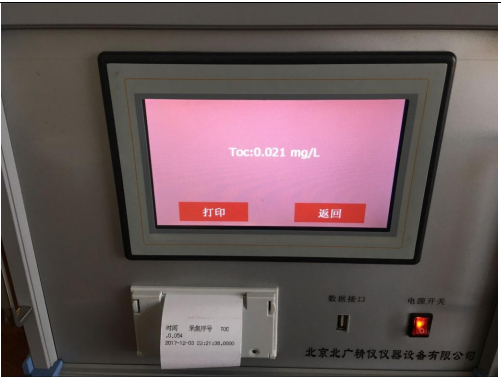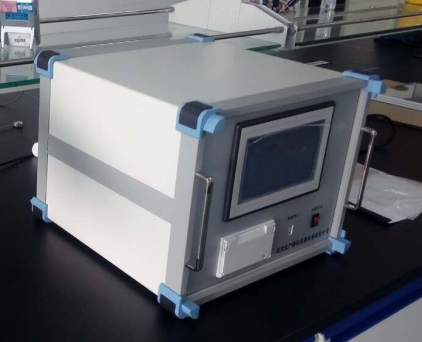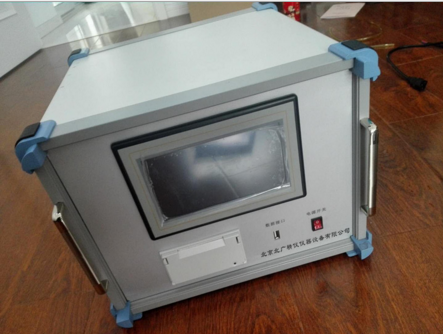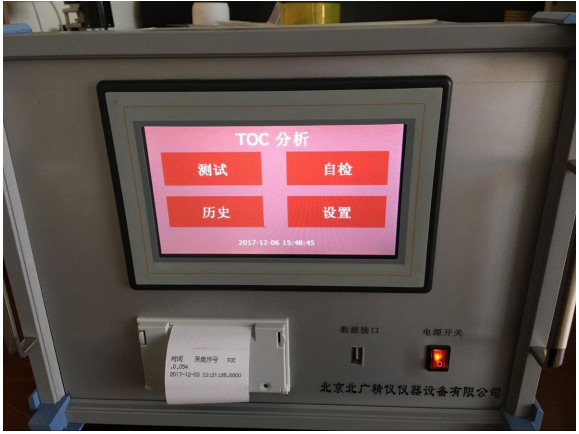河北TOC分析仪厂家 产品特点
1.仪器采用便携设计,使用轻便,方便移动至取样点。
2.采用嵌入式系统,触摸屏设计,纯中文操作方便简易。
3.针对制药用水(TOC含量在1000ppb以下)总有机碳含量的检测设计,进行检测。
4.配备大量的储存空间,能够存储大量的测试数据。
5.中文打印,输出测试参数、测试结果。
6.在使用、贮存和更换过程中不需要气体或试剂,无移动部件,减少维修和维护成本。
7.当测试样品浓度超过规定限度,仪器能够自动报警,并输出控制信号。
8.符合国家《中国药典》 CP2010规定的测试方案,可以提供IQ/OQ/PQ服务。
河北TOC分析仪厂家 产品特点
1.仪器采用便携设计,使用轻便,方便移动至取样点。
2.采用嵌入式系统,触摸屏设计,纯中文操作方便简易。
3.针对制药用水(TOC含量在1000ppb以下)总有机碳含量的检测设计,进行检测。
4.配备大量的储存空间,能够存储大量的测试数据。
5.中文打印,输出测试参数、测试结果。
6.在使用、贮存和更换过程中不需要气体或试剂,无移动部件,减少维修和维护成本。
7.当测试样品浓度超过规定限度,仪器能够自动报警,并输出控制信号。
8.符合国家2010版《中国药典》规定的测试方案,可以提供IQ/OQ/PQ服务。
参数:
1 | 测量范围 | 0.01mg/L~1.000 mg/L |
2 | 精度 | ?4% |
3 | 分辨率 | 0.001mg /L |
4 | 分析时间 | 40分钟 |
5 | 响应时间 | 8分钟 |
6 | 检测极限 | 0.001mg /L |
7 | 样品温度 | 1- 95℃ |
8 | 电源要求/功能 | 220V |
9 | 重复性误差 | ≤3% |
10 | 显示屏 | 彩色触摸屏 |
运行要求
? 交流电源:170~260 V,频率:50/60 Hz ;
? 分析仪的量程是:电导率< 10.0 us/cm ;TOC < 1.0 PPM 。如果水样中的无
机碳或有机碳浓度超出了仪器的检测范围,需使用高纯水或有机碳浓度较
低的去离子水冲洗管路。
? 仪器运行的环境温度5℃ – 40 ℃。
测试方法及其原理
国家药典委员会发布的《中华人民共和国药典2010 版》二部中推荐采用在线和
离线两种测试方法,还提供了系统适应性试验的操作方法。同时对测试总有机碳的仪
器也提出了要求,即首先要能区分无机碳和有机碳;并能排除无机碳对总有机碳的影
响;其次应满足系统适应性试验的要求;最后仪器应具有足够的检测灵敏度。
要检测样品中的有机物浓度,必须将有机物分子分解并且转化成能够测量的单
分子形式,这样就必须把有机物氧化成二氧化碳,并对生成的二氧化碳进行测量。目
前氧化的方法有四种:一、燃烧法;二、光氧化法;三、湿法氧化;四、光化学法。
氧化后有机碳测试的方法有差减法和直接法两种。
其中差减法的表达式为TOC=TC-IC,即总有机碳是总碳(TC)与无机碳(IC)的差值。
TA-1.0 分析仪采用的氧化方法是光氧化法:
H2O hn(185nm)‐>OH? H? OH? 有机物‐>CO2 H2O
二氧化碳的测量方式是差减法:TOC = TC- IC
系统适应性验证
系统适应性验证是一种检验TOC 分析仪氧化能力的试验方法,其计算公式如下:
仪器响应效率(%)=((rss - rw)/(rs - rw)) * 100%
其中:
rss —— 为 1-4 对苯醌对照品溶液的响应值;
rs —— 为蔗糖对照品溶液的响应值;
rw —— 为总有机碳检测用水的空白响应值;
主要配置
主机 一台
触摸屏 (镶嵌到仪器中)
微型打印机 一台
进样管 一条
电源线 一套
产品说明书 一份
产品合格证 一份
产品装箱单 一份
运行要求
1交流电源:170~260 V,频率:50/60 Hz;
2分析仪的量程是:电导率< 10.0 us/cm;TOC < 1.0 PPM。如果水样中的无
机碳或有机碳浓度超出了仪器的检测范围,需使用高纯水或有机碳浓度较
低的去离子水冲洗管路。
3仪器运行的环境温度5℃ –40℃。
安全措施忠告:
1.请保证电源可靠接地;
2.电源电缆线的线径> 2.5 mm2;
3.请勿将仪器浸泡于水或其它液体中。
分流器
水样进入仪器后分成相同流量的两路,其中一路通过延迟线圈进入二氧化碳传感器,检测TIC,另一路通过氧化反应器利用紫外灯(UV灯)加二氧化钛薄膜光催化氧化作用将有机物分解为二氧化碳,进入二氧化碳传感器检测TC。总有机碳可通过这个差值计算得到:TOC = TC–TIC。
氧化反应器
仪器利用UV射线在二氧化钛光催化剂的作用下将有机化合物氧化成二氧化碳,氧化反应器是一个UV灯外包螺旋形的石英管。UV灯发出185nm和254nm的光线,使水产生光分解。
H2O hν(185nm)(TiO2)? OH? H?
羟基自由基(OH?)能完全把有机化合物氧化为二氧化碳。
有机物 OH?? CO2 H2O
UV灯的使用寿命为6个月,当更换时间到期时仪器将出现警告信息,提醒用户更换UV灯。
二氧化碳测量循环
仪器每4分钟检测得出一个数据(包括TOC值和电导率值),在4分钟的测量循环中TC和TIC是独立检测的。
Product Features
1. The instrument adopts a portable design, which is easy to use and convenient to move to the sampling point.
2. Adopting an embedded system and touch screen design, pure Chinese operation is convenient and easy.
3. Design and conduct testing for the total organic carbon content of pharmaceutical water (TOC content below 1000ppb).
4. Equipped with a large amount of storage space, capable of storing a large amount of test data.
5. Print in Chinese and output test parameters and results.
6. No gas or reagents are required during use, storage, and replacement, and there are no moving parts, reducing maintenance and repair costs.
When the concentration of the test sample exceeds the specified limit, the instrument can automatically sound an alarm and output a control signal.
8. According to the testing plan specified in the Chinese Pharmacopoeia CP2010, IQ/OQ/PQ services can be provided.
Product Features
1. The instrument adopts a portable design, which is easy to use and convenient to move to the sampling point.
2. Adopting an embedded system and touch screen design, pure Chinese operation is convenient and easy.
3. Design and conduct testing for the total organic carbon content of pharmaceutical water (TOC content below 1000ppb).
4. Equipped with a large amount of storage space, capable of storing a large amount of test data.
5. Print in Chinese and output test parameters and results.
6. No gas or reagents are required during use, storage, and replacement, and there are no moving parts, reducing maintenance and repair costs.
When the concentration of the test sample exceeds the specified limit, the instrument can automatically sound an alarm and output a control signal.
8. According to the testing plan specified in the 2010 edition of the Chinese Pharmacopoeia, IQ/OQ/PQ services can be provided.
Parameters:
Measurement range: 0.01mg/L to 1.000mg/L
2 accuracy?4%
3 Resolution 0.001mg/L
4 analysis time 40 minutes
5 response time 8 minutes
6 detection limit 0.001mg/L
Sample temperature: 1-95℃
8 Power Requirements/Function 220V
9. Repetitive error≤3%
10 color touch screen display
Operational requirements
AC power supply: 170-260 V, frequency: 50/60 Hz;
The range of the analyzer is: conductivity<10.0 us/cm; TOC < 1.0 PPM。If there is none in the water sample
The concentration of organic carbon or organic carbon exceeds the detection range of the instrument and requires the use of high-purity water or organic carbon with a lower concentration
Rinse the pipeline with low deionized water.
The ambient temperature for instrument operation is between 5℃and 40℃.
Testing methods and principles
The National Pharmacopoeia Committee recommends the use of online and offline methods in Part II of the 2010 edition of the Pharmacopoeia of the People's Republic of China
Two offline testing methods are available, and the operation method for system adaptability testing is also provided. Simultaneously testing the instrument for total organic carbon
The device also requires the ability to distinguish between inorganic carbon and organic carbon; And it can exclude the influence of inorganic carbon on total organic carbon
Sound; Secondly, it should meet the requirements of system adaptability testing; Finally, the instrument should have sufficient detection sensitivity.
To detect the concentration of organic compounds in a sample, it is necessary to decompose the organic molecules and convert them into measurable monomers
In molecular form, it is necessary to oxidize organic matter into carbon dioxide and measure the generated carbon dioxide. The eyes
There are four methods for pre oxidation: first, combustion method; 2、Photooxidation method; 3、Wet oxidation; 4、Photochemical method.
There are two methods for testing organic carbon after oxidation: differential method and direct method.
The expression for subtraction is TOC=TC-IC, which means total organic carbon is the difference between total carbon (TC) and inorganic carbon (IC).
The oxidation method used by the TA-1.0 analyzer is photooxidation:
H2O hn (185nm) ->OH? H?OH? organic compounds ->CO2 H2O
The measurement method for carbon dioxide is subtraction: TOC = TC-IC
System adaptability verification
System adaptability verification is a test method for testing the oxidation ability of TOC analyzer, and its calculation formula is as follows:
Instrument response efficiency (%)=((RSS RW)/(RS RW)) * 100%
Among them:
RSS - the response value of 1-4 benzoquinone reference solution;
Rs - the response value of sucrose reference solution;
RW represents the blank response value of water used for total organic carbon detection;
Main configuration
One host
Touch screen (embedded in the instrument)
One micro printer
One injection tube
A set of power cords
One copy of product manual
One copy of product qualification certificate
Product packing list copy
Operational requirements
1. AC power supply: 170-260 V, frequency: 50/60 Hz;
The range of the analyzer is: conductivity<10.0 us/cm; TOC < 1.0 PPM。If there is none in the water sample
The concentration of organic carbon or organic carbon exceeds the detection range of the instrument and requires the use of high-purity water or organic carbon with a lower concentration
Rinse the pipeline with low deionized water.
The operating environment temperature of the instrument ranges from 5℃to 40℃.
Safety measures advice:
1. Please ensure that the power supply is reliably grounded;
2. The diameter of the power cable is greater than 2.5 mm2;
3. Do not immerse the instrument in water or other liquids.
Diverter
After entering the instrument, the water sample is divided into two equal flow paths. One path enters the carbon dioxide sensor through a delay coil to detect TIC, while the other path uses an oxidation reactor to decompose organic matter into carbon dioxide through the photocatalytic oxidation of a titanium dioxide film using a ultraviolet lamp (UV lamp), and enters the carbon dioxide sensor to detect TC. The total organic carbon can be calculated by this difference: TOC = TC–TIC。
Oxidation reactor
The instrument uses UV rays to oxidize organic compounds into carbon dioxide under the action of titanium dioxide photocatalyst. The oxidation reactor is a spiral quartz tube wrapped around a UV lamp. The UV lamp emits light at 185nm and 254nm to decompose aquatic products.
H2O hν(185nm)(TiO2)OH? H?
Hydroxyl radicals (OH?) can completely oxidize organic compounds to carbon dioxide.
Organic compounds OH?CO2 H2O
The service life of UV lamps is 6 months. When the replacement time expires, the instrument will display a warning message to remind the user to replace the UV lamp.
Carbon dioxide measurement cycle
The instrument detects data (including TOC and conductivity values) every 4 minutes, and TC and TIC are independently detected during the 4-minute measurement cycle.